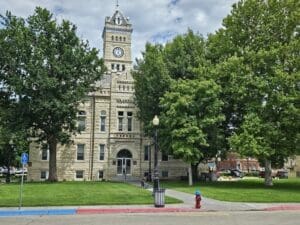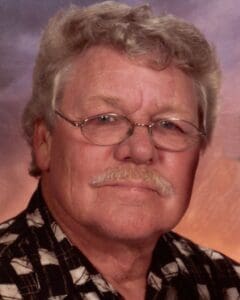Brothers Moses, William, and Jeremiah Younkin are listed as the first white settlers in Clay County, Kansas. They arrived to the Timber Creek area in April of 1856, joining Native Americans on the land. Their cousin, John Pringey King, was also with the brothers. Hailing from Pennsylvania, the four men lived in Illinois, then to Kansas territory. They first landed in Pottawatomie County before making it to Clay.
Kansa or Kaw Native Americans pre-dated this settlement back to prehistoric times. Area counties reported conflicts with incoming residents, however the Kansa division in Clay County was notably peaceful in early stages. In any case, reports state that incoming residents avoided their camps.
Jeremiah “Jerry” Younkin (1828-1907) was married to Elizabeth Branscom in 1860 in Riley County. They had five children, four of whom survived into adulthood. Jerry was buried in Milford Cemetery alongside Elizabeth, who outlived him by 11 years.
Moses Younkin (1830-1892) married Lavilla Mitchell while still in Pennsylvania in 1851. They had two children, Emma and John, when traveling to Kansas. Their second son, Edwin, was listed as the first white baby born in the county, which took place in 1858. In total, the pair had eight kids before Lavila died in 1879 and was buried at Timber Creek. Moses left for Washington territory, but returned to marry his second wife, Mary Thompson, in 1883.
Weekly, Moses hosted church services, which others would travel via ox teams to attend. His stone house stood until the Milford Dam was contracted. He was allegedly well-versed with Western scouts Buffalo Bill and Wild Bill Hickok.
On March 31, 1864, Moses enlisted in the Union Army as a sergeant, along with another brother, Alfred (born 1840), who enlisted as a private. Alfred died of bilious fever, an outdated medical term to describe fevers accompanied with symptoms like vomiting, jaundice, or diarrhea. Just eight days after Alfred’s death, Moses was mustered out of the military, serving until Sept. 26, 1865.

Moses was found with a fractured skull in 1892, after moving back to Washington State. He is said to have been hit with a hammer or ax after he was robbed of his watch and $12 in Civil War pension funds. ($421) However, another report says he was drunk and fell. Either way it was reported that the pension funds had been received earlier that day, plus $22.50 ($790) for clearing Senator Canfield’s land, and were gone when he was found conscious, but severely injured. He was taken to a nearby home where citizens attempted to ask questions; Moses could not speak and contradicted yes/no questions before he died.
Mary filed for and received his pension before dying in 1895 in Washington. Widows were eligible to receive between $25 and $40 per year. ($878-$1,405 in 2025 dollars.)
William Younkin (1832-1917) married Ruth Ann Howard in Illinois in 1862. They had six children before Ruth Ann died in 1885. William was remarried to Elida Scott, who was the widow of another area pioneer. William died while still living on the original Timber Creek homestead.
John King (1833-1906) was the oldest brother of Mary King Younkin, two children of Jacob King and Eve Pringey. John met and married Mary Bowers in 1859 in Junction City. The pair had three daughters, two of whom died in their 20s. Their surviving daughter, Marinda King, was wed to John Male in 1885, having at least eight children. King donated land for the former Timber Creek school and was vocal about his kids’ education, fueled by Mary’s inability to read or write.
Above: Henry F. And Mary (King) Younkin, the brothers’ parents. Left: Moses King. Research via Susan Hammond.













